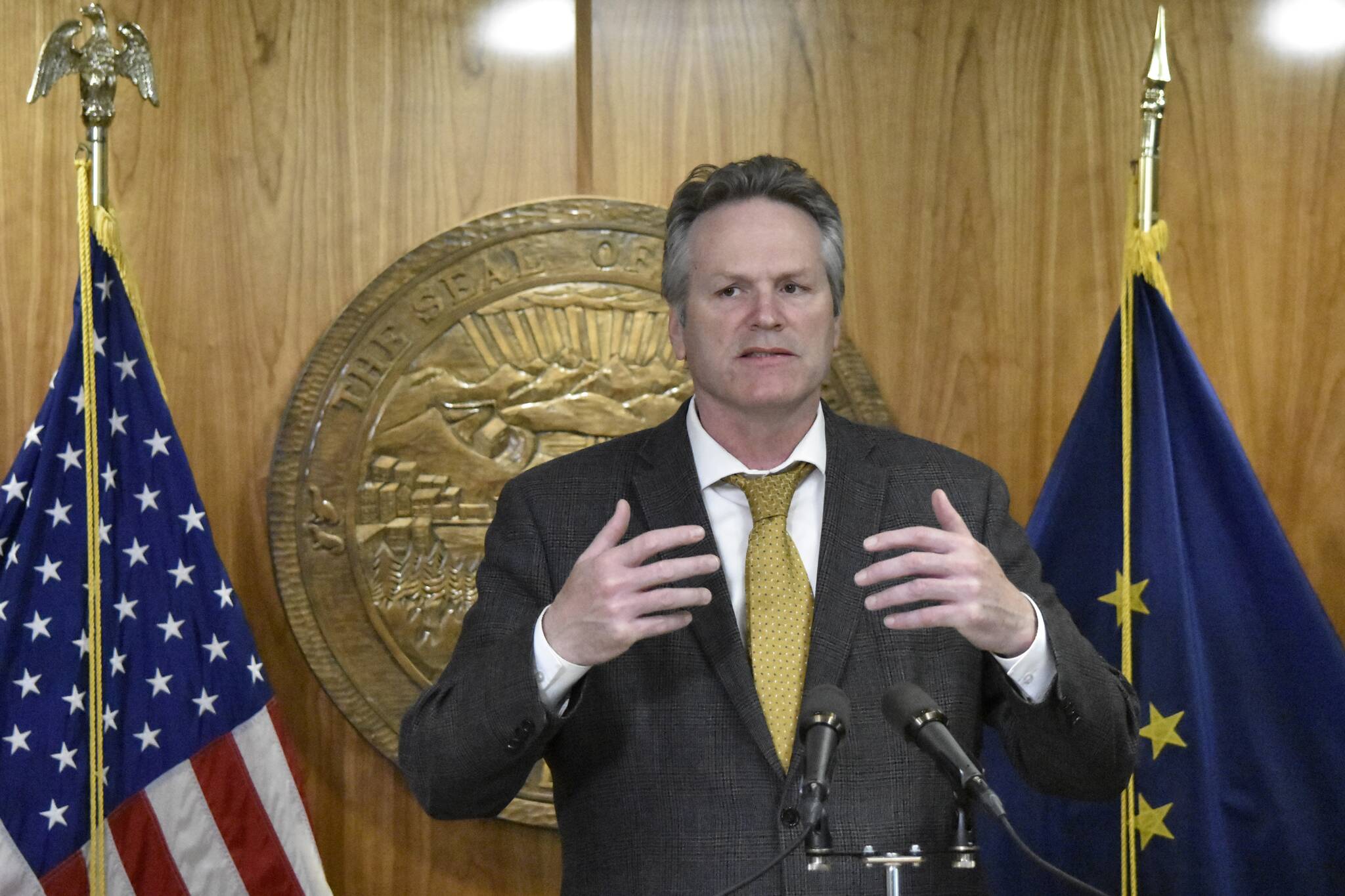At a news conference in a mostly empty Alaska State Capitol Thursday, Gov. Mike Dunleavy thanked state lawmakers for sending him a complete budget, saying there was no need for a special session.
“This budget is fully functional,” Dunleavy said. “There is no reason for this Legislature to come back.”
Last year, lawmakers went through four special sessions — the most in state history — before they were able to finalize the budget.
The governor said his office would start reviewing the budget Thursday afternoon and in the coming days would analyze the many bills passed by the Legislature in the final days of the session. The Legislature passed dozens of bills in the days leading up to the end of the session, some of which will have far-reaching implications for the state.
One of those bills is the Alaska Reads Act, which was sent to the House after the Senate added the bill as an amendment to an unrelated education bill. The bill creates reading guidelines for early elementary school with screening tools used to track student progress, but also contained provisions for a state-funded pre-K program and extra funding for struggling districts.
At the news conference Thursday, Department of Education and Early Development Commissioner Michael Johnson said the provisions in the bill would help both schools and families.
“We’re already well on our way to making sure all students in Alaska can learn to read,” Johnson said.
But on the House floor Wednesday night, the addition of the bill as an amendment caused pushback from some lawmakers. The Senate passed the Alaska Reads Act on its own, but the bill was voted down by the House Education Committee.
Rep. Bryce Edgmon, I-Dillingham, said Wednesday the Alaska Reads Act tried to achieve something noble, but the contents of the bill would hurt rural Alaska.
“It sidesteps the real issue, which is teacher recruitment and retention,” Edgmon said. “If you were to write a bill for big schools, I would write it just like this.”
Dunleavy said he would sign the bills he believes will benefit Alaskans but was also deeply critical of the Legislature for not passing his proposed bills for land transfers to Alaska Native veterans.
Alaska Native veterans of the Vietnam War era have been trying to get land transfers from the federal government for years, and in 2021 Dunleavy introduced a bill that would have allowed for transfers of state land to eligible veterans.
“This was a moral imperative to right a wrong,” Dunleavy said. “I thought we could.”
The budget bill passed out of the Legislature on Wednesday provides eligible Alaskans payments of roughly $3,150, a combination of a $2,500 Permanent Fund dividend and a $650 energy relief payment. The conference committee that negotiated the final version of the bill proposed an energy payment of $1,300, but split the fund sources to have half the funds come from the Constitutional Budget Reserve, which requires a three-quarter vote to pass. The House failed by one vote to approve the CBR draw, with some members of the House Majority Coalition voting against the move. If both bodies had approved the CBR draw, Alaskans would have received roughly $3,850 from the state this year.
[Legislature passes budget with minutes to spare]
The amount of the dividend and the formula used to calculate it has been deeply contentious issues for the Legislature since the state stopped following the formula following a drop in the price of oil. Several lawmakers, mostly Republicans, have advocated for following the formula, even at the expense of state services. Sen. Lora Reinbold, R-Eagle River — the only senator not to vote for the budget — cited the lack of meaningful cuts in the state budget in her remarks on the floor.
Several lawmakers and Dunleavy have coalesced around a plan to split the state’s annual percent of market value draw from the earnings of the Alaska Permanent Fund with half going to dividends and half to state spending. But members of the Senate Finance Committee have noted that without roughly $800 million in new revenues, or cuts to state spending, the so-called 50-50 dividend isn’t sustainable.
The governor has the ability to line-item veto certain items of the budget, and while Dunleavy said Thursday there likely would be reductions, he couldn’t say where they would be.
Dunleavy — a longtime supporter of a statutory dividend — used the 50-50 formula in his own budget proposal released in December 2021, but also included a $1,200 supplemental payment to the previous year’s dividend. Following updated revenue projections in March, Dunleavy called on lawmakers to pass a dividend of “at least” $3,700.
If both bodies had approved the CBR draw, Alaskans would have received roughly $3,850 from the state this year.
Dunleavy said Thursday he would have liked to see a statutory dividend but was glad to see the largest PFD in state history.
“Is this a budget that I would have liked? No. But we understand the process,” Dunleavy said.
Campaign season
Two of Dunleavy’s opponents in the race for governor issued statements following the passage of the budget.
“For three years Dunleavy has harmed educational opportunity, vetoed pre-k, shifted state costs to communities, and paid an average $1,230 PFD — all because he has refused to get the fair oil revenue this state deserves,” said Democratic candidate Les Gara, a former House member.
Former Gov. Bill Walker, who is running as an independent, criticized Dunleavy for supporting a large dividend at the expense of state services. Walker’s administration was the first not to follow the dividend formula
“(Dunleavy) spent the past week pushing a massive and unsustainable PFD proposal that would have resulted in a $1 billion deficit despite currently high oil prices,” Walker said. That’s not fiscal conservatism, that’s chaos.”
Contact reporter Peter Segall at psegall@juneauempire.com. Follow him on Twitter at @SegallJnuEmpire.

